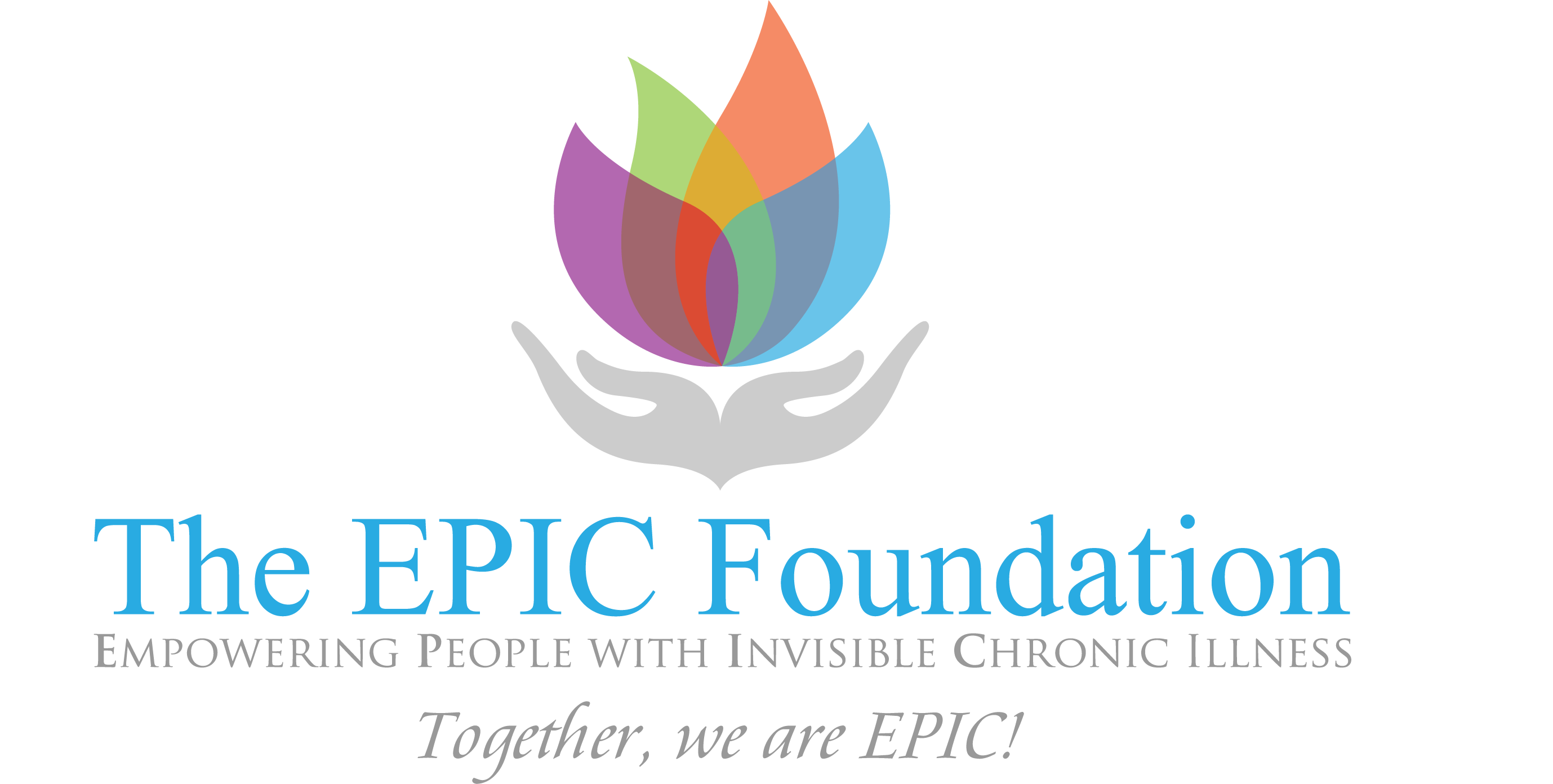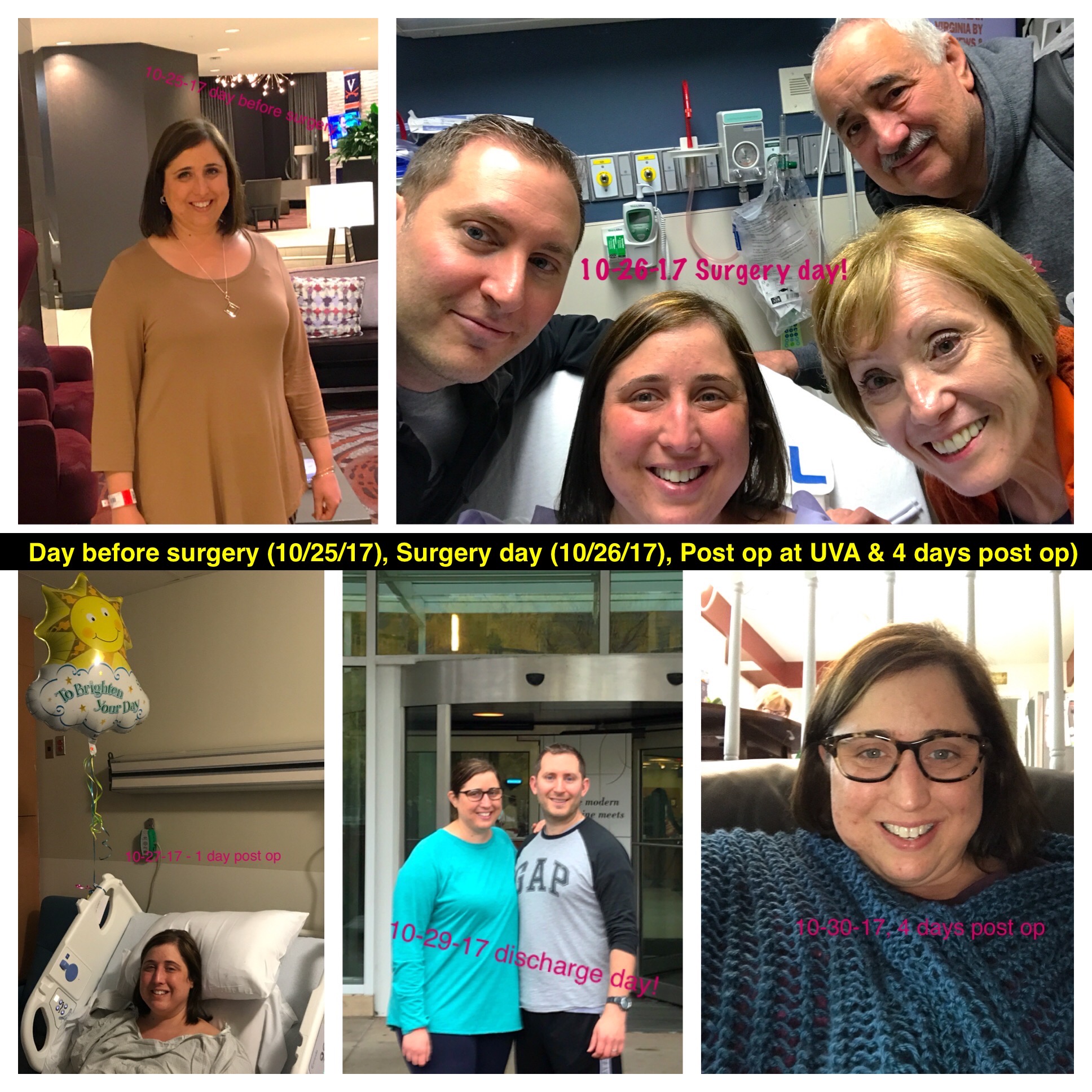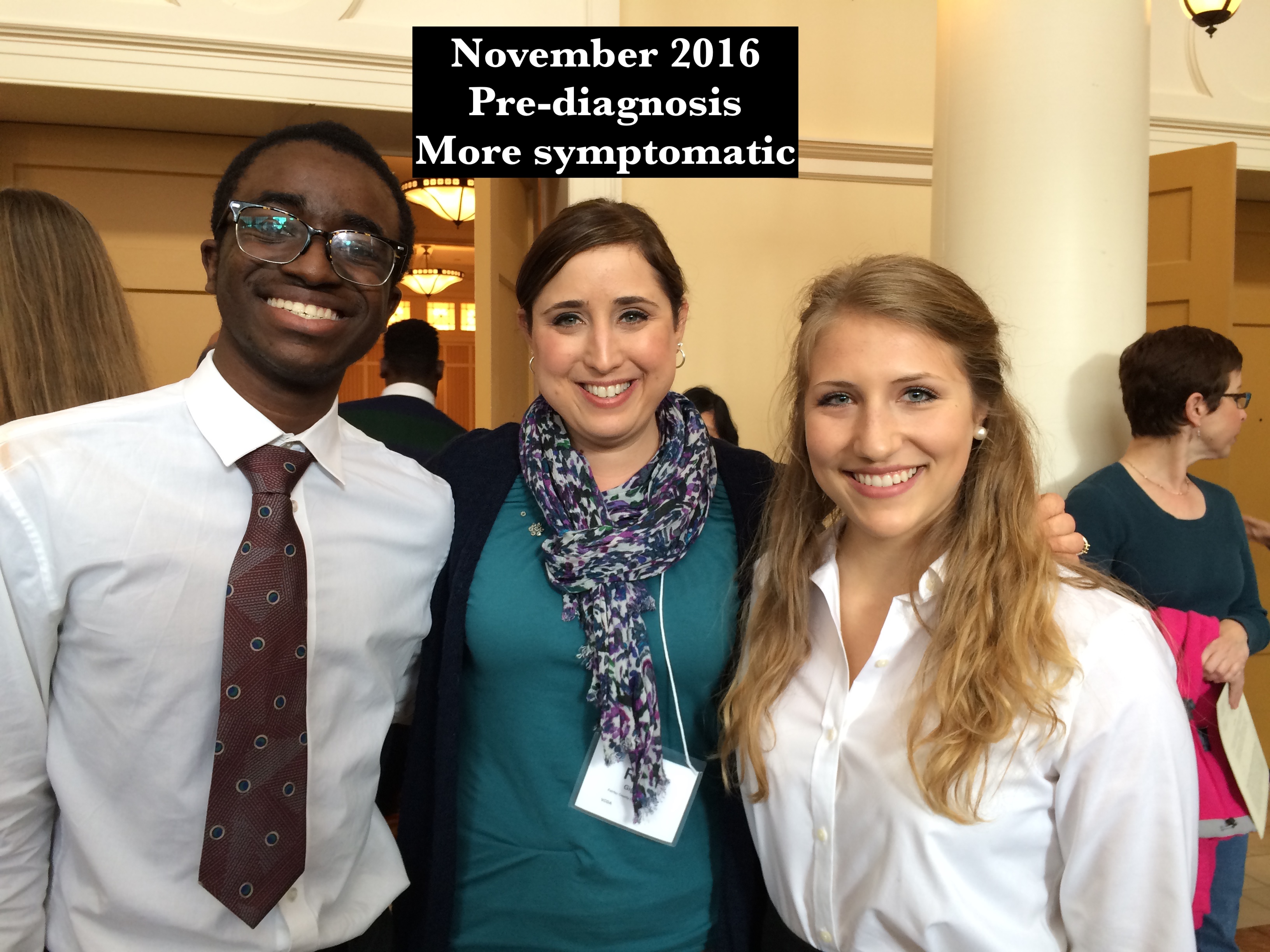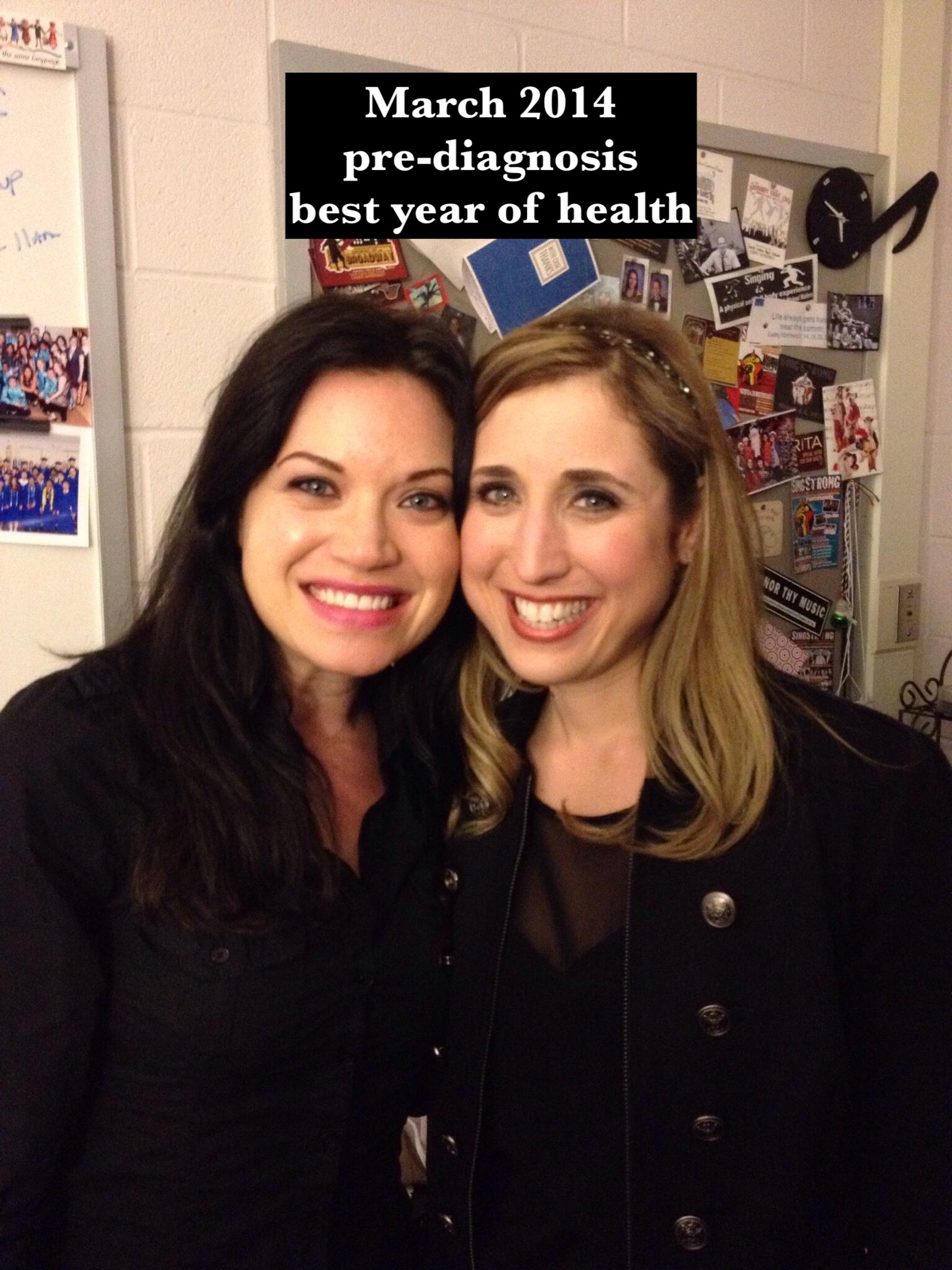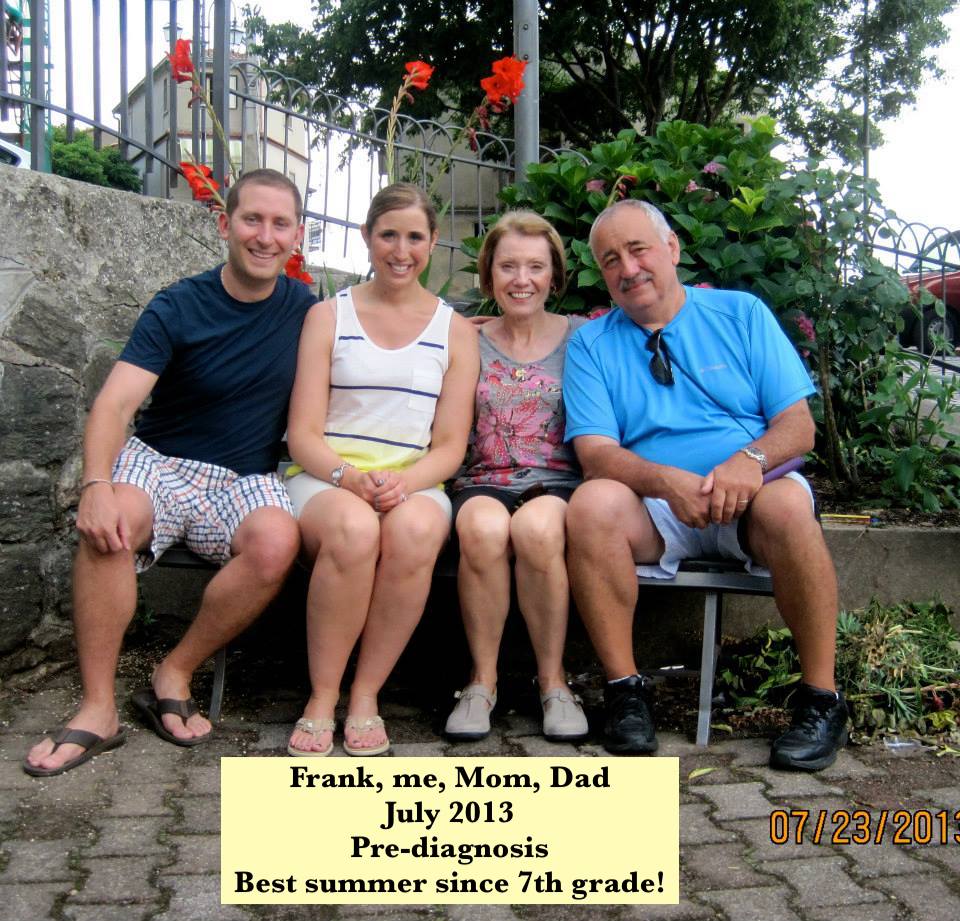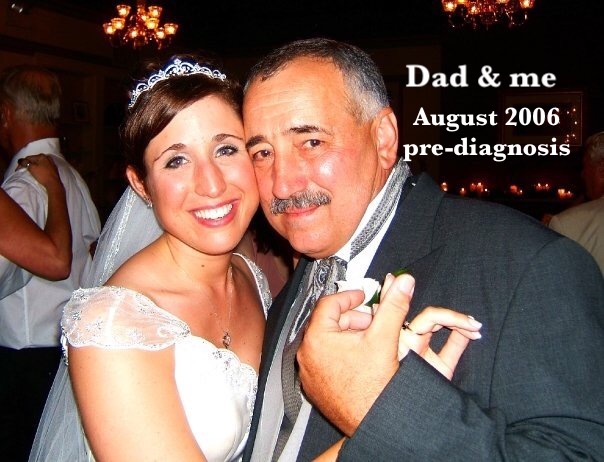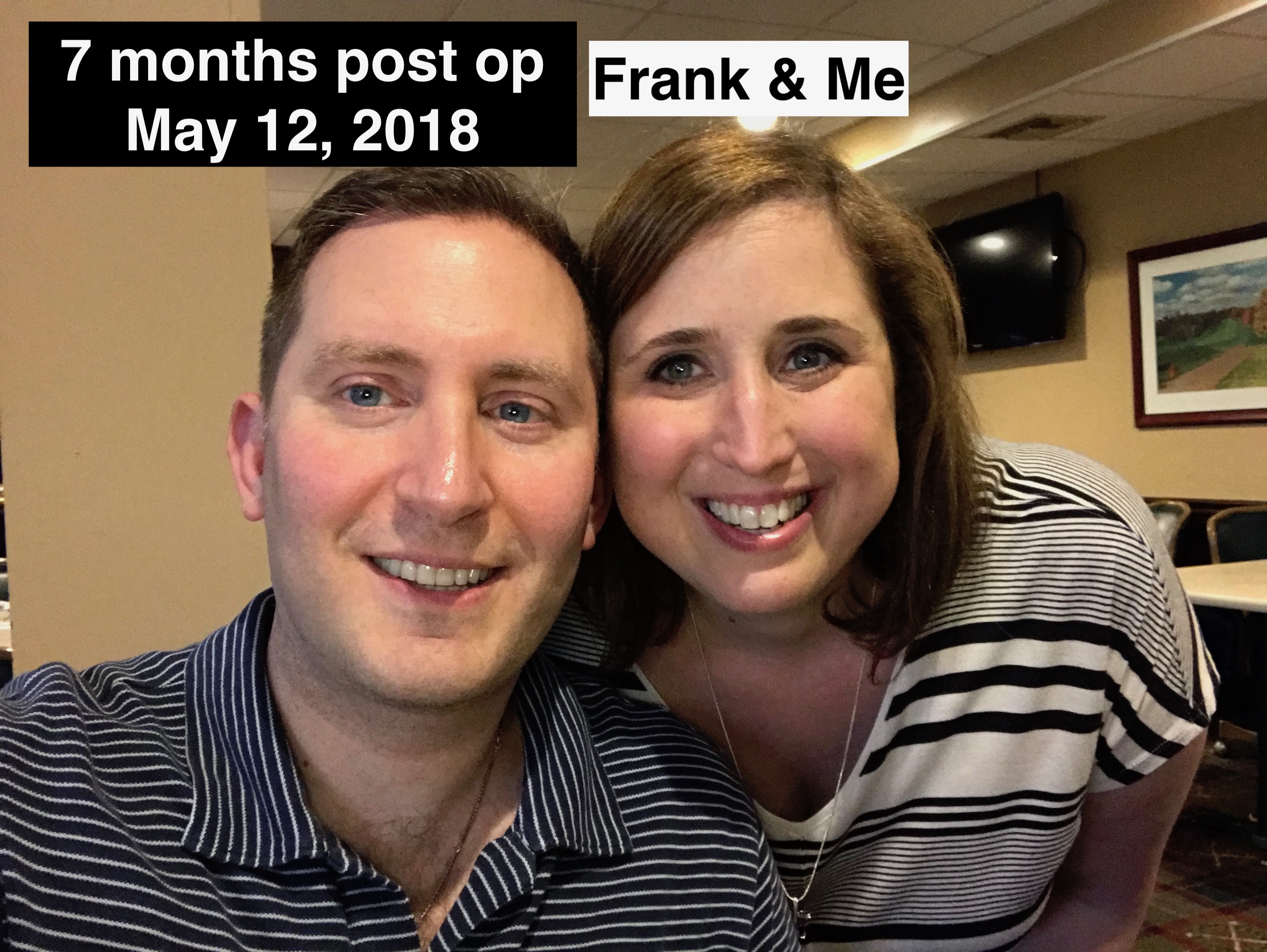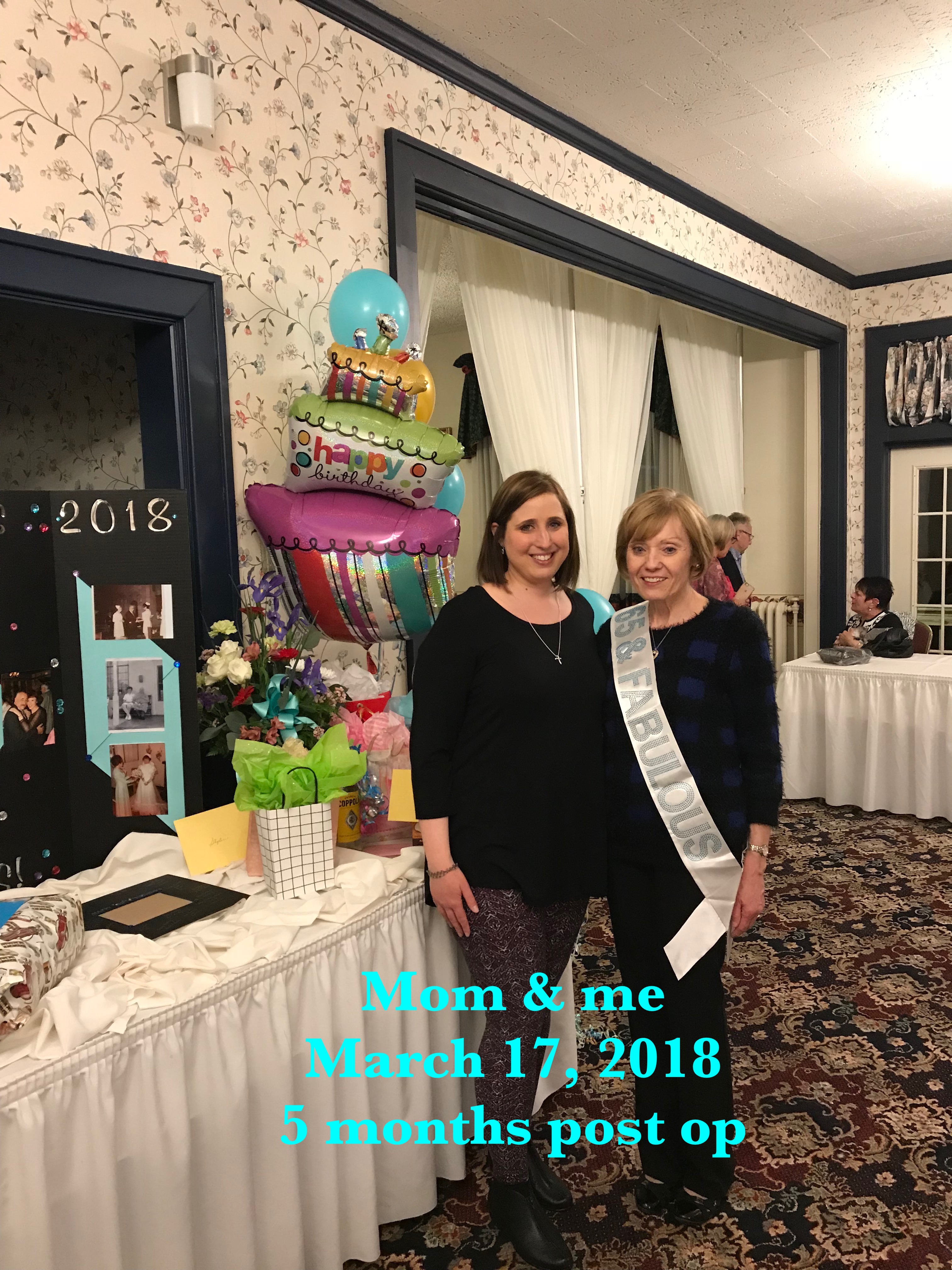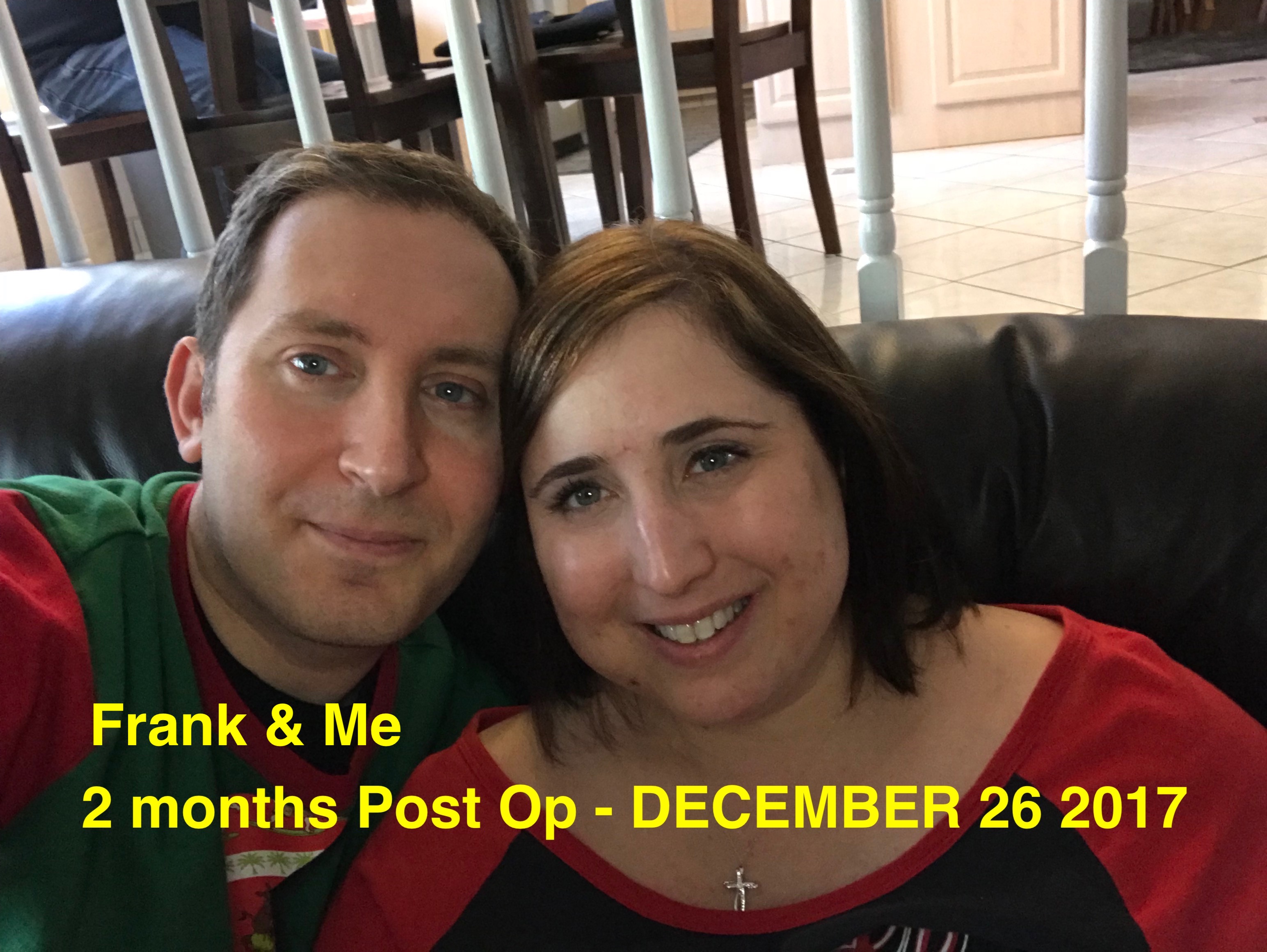Rita Gigliotti
Person of the Month-June 2018
The EPIC Foundation would like to recognize Rita Gigliotti as our Person of the Month for June, 2018! Please enjoy the below Q&A with Rita as well as the links, videos, and pictures at the bottom of this page.
Rita’s introduction: I would like to begin by thanking Dr. Karen Thames and the EPIC foundation for providing a platform for me and many others to share our journeys with Chronic Illnesses. This opportunity fell into my lap unexpectedly during my ongoing battle and recovery with Cushing’s Disease. While I reflect each day on why I am in this war with illness I have come to believe that part of my life’s purpose, in my next chapter, is to be an advocate. Sharing my story took a lot of courage for me, but it may help one person out there. I know that when I got diagnosed with Cushing’s I read every story I could find on the Cushing’s Research Support Foundation site and joined all of the online support groups and it comforted me, in a way, to know that others have gone through or are going through the same thing. Most of the time, I felt like I was reading my own medical autobiography. I also want to take a moment to note that the videos I have shared were gifts to me during my recovery. These special musical performances continue to bring me strength and light and I hope they will do the same for you. The young people performing are sharing their love, passion and power to heal with their talents. I am blessed to call these young people my students, and I am grateful to them, their families, my colleagues and friends for reminding me that I am not alone. As you read my story, you will learn that music and community have been cornerstones to my journey and now I am thankful that the EPIC foundation community has become another facet to my support system.
1. Describe the community you serve and the work that you do: I am blessed to be a high school choral director at South Lakes High School in Reston, Virginia, a beautiful, suburban community about 30 miles outside of Washington, D.C.
2. What motivates your vision to help this community and increase awareness? In addition to my own personal journey, I see an increasing number of children around me struggling to cope with chronic illnesses. It breaks my heart because having asthma and allergies my entire life often alienated me from being able to participate in many things like my friends. It limited my activities and I spent a lot of time in the hospital. Now, going through Cushing’s Disease (and enduring several other chronic illnesses throughout my life) my empathy and understanding of chronic illness has expanded. Music has always been a form of healing and joy for me; and, with it being my career, my rehearsal room offers music as a release and therapy to children every day. For them, choir is their safe haven, their school family and something that allows them to connect in a very vulnerable and beautiful way with other beings and allows them to set aside their worries, obstacles, and struggles and focus on the present moment and its beauty. It is empowering to create something beautiful that heals you on a personal level and also extends to those around you.
3. When did you actually start being involved in the community? How do you most effectively reach your community i.e. students, colleagues, etc: Follow your passion and you will find your purpose. I have spent my entire life wanting to be a professional musician; and, at age 10 I identified with a passion for being a music teacher, specifically, a choral director. So, as I tell everyone – Music is who I am not what I do. My connection with music and my passion for sharing it with others runs to the very core of me. I can’t imagine my life without it. Music is on my brain 24/7 in one way or another and I wouldn’t have it any other way. I earned a Bachelor of Music in Music Education in 2001 and began my professional career in August, 2001. During my first years of teaching middle school choir and general music I also completed my Masters of Music in Music Education in 2005. In 2004, I met the love of my life and ended up moving to Northern Virginia in 2005 where I embarked upon a new chapter, as the High School Choral director at South Lakes High School in Reston, VA. Chorus is community. Music is community. And this community, has, and continues to bring me endless support and love during my battle with Cushing’s Disease.
4. Did you have a role model or a person who motivated you?: I have been fortunate to have some outstanding role models in my life in both the personal and professional realms. Two of my role models related to chronic illness are my Nonna (grandmother, deceased) and my Dad. Both of them conquer(ed) chronic illness every day. Their fortitude, faith, and determination are what remind me that I can beat Cushing’s. My father got very sick with a rare endocrine disease at the very same age (38) as me getting diagnosed with Cushing’s Disease. I remember being in 7th grade at the time and how I never realized all that he really was going through because my parents did such an incredible job of protecting me from so much of his pain and always providing for me, even in their most difficult times. They consistently sought to bring me a ‘normal’ life despite the life changing challenges they were enduring. To this day, all of this still holds very true. My Dad still has to warrior through his chronic illnesses of Niemann Pick Disease and Type 2 Diabetes. He is still working and throughout the last year he has given up nearly every weekend to drive from Pennsylvania to Virginia to support me and help me cope with each phase of Cushing’s and its recovery. My Nonna was simply a warrior. She always reminded me through her perseverance that anything is possible if you are strong in your faith. She endured 2 open heart surgeries with valve replacements, a terrible fall that resulted in blood clots that hit her kidneys then putting her in to renal failure for the rest of her life. She spent nearly an entire year in the hospital where she had a near death experience. The day she shared this with me opened up a new level of faith and eased many of my doubts about Eternal life. She died very young at the age of 66 from a sudden heart attack. I remember visiting her while on life support and telling her it was okay to go to the ‘light’ (this is the light she described to me in her near death experience). Shortly after I left her side, she passed while still on the ventilator. I truly believe she waited for me and needed me to let go in order for her to move on to the beautiful, calming place that was waiting to embrace her and heal her from all of her illnesses. Both my Nonna and my Dad have warm, loving, and giving hearts and a seemingly endless supply of patience and strength.
4. At The EPIC Foundation, our slogan is “Together we are EPIC!” Tell us who the people are in your corner who help to keep you going and who you collaborate with to move your vision and mission forward?: I am fortunate to have many people cheering me on as I recover from Cushing’s Disease. My…. husband, Francesco, is my rock. Mom is my real life angel. Dad is my inspiration. Puppies Holly & Kaylee are my joy. Family is love. Health & medical teams are my restoration. Friends & support group members give me hope. Students (who I love and miss very much) are my daily motivation. Colleagues, music & performing arts community are my light. One person that I would like to pay tribute to in my recovery is Shianne Lombard-Tremann. I first connected with Shianne through the Cushing’s Support Research Foundation resource page where she was listed in the ‘patient stories’ section and who could be reached for questions and encouragement. When I was struggling with joint and muscle pain and weakness and overwhelmed with trying to get out of my bed every morning because of the debilitating pain she came to my rescue with her own story: Be Your Own Doctor and her passion to help those with chronic illness and specifically Cushing’s Syndrome and Cushing’s Disease by using her expertise, as a personal trainer, to develop rehabilitation exercises and a 30 day movement challenge to get me from the bedside and back to basic movement without so much pain. I started her challenge two and half months after surgery. It was exactly what I needed to start building my strength back again and each week I developed more confidence in my daily activities, gently increasing my repetition and duration every few days. When I learned that Shianne left us my heart was broken. I can empathize with her daily struggles and frustrations; though, to the world around her she was a special bright light who inspired many to work at being their best selves. Her beautiful legacy is here to remind us that anything is possible through determination, passion, perseverance, and love. She brought so much joy and love to everyone in her life. In addition to her helping me find my physical strength again, I also was introduced to the EPIC Foundation through her. I will never forget the part she has played in my recovery.
5. What drives your passion? Additionally, who are the people you try to reach?: My passion for life is in music and sharing its beauty and power with others, and giving to and serving others in ways that will bring them happiness, strength, healing, and love. Through EPIC I hope that sharing my story will bring encouragement to my fellow warriors and sharing the special music that my colleagues and students have performed, in support of me, will uplift others who are struggling. I have been unable to work since March 2017 because that’s when my struggle with Cushing’s Disease came to a peak and my life came to a halt. My students have been a huge motivation for me each day.
6. Can you tell us some background information about you? Your back story? Your own journey up until now: I grew up in Richeyville, PA, a small town, about 60 miles South of Pittsburgh. My lifelong passion has always been to be a music teacher. I have been singing since I was 4 and started formal piano lessons when I was 7. Later I began studying voice privately and was very active in my school music program, music ministry at my church, competed and attended all of the district, regional, state and eastern division honors choirs, and then followed my passion into college where I obtained my degrees.
Being a performing arts kid, I learned at an early age how to recover quickly, succeed under pressure, persevere, and maintain self-discipline. My first struggles with chronic illness began as a baby with severe allergies and asthma. I can remember the many car rides and hospital visits and stays throughout my early childhood in treating severe asthma attacks. I remember the early days of allergy shots every week. I know what it feels like to be the kid who can’t play outside in the grass, or have inside pets or go to the zoo without an allergy and/or asthma attack, who can’t camp out, who needs an inhaler before playing sports, who needs to take an inhaler and allergy medications every day to function. It wasn’t fun or easy; but, I learned how to cope quickly and I didn’t let this stop me from exploring my passion in music and the performing arts or living my life, in general.
In middle school, puberty hit, and then new symptoms arose with facial hair and weight gain. I can remember going from a size 0 to a size 8 from 7th to 8th grade. In high school things progressed with losing a lot of my hair (as a child I had really thick, beautiful hair and in high school it started thinning rapidly), struggling with my weight (having to work very hard to stay thin), being extremely fatigued, and then having irregular, heavy and extremely painful menstrual cycles.
The least invasive treatment was the birth control pill. So, for at least 10 years I worked through literally every type of birth control pill on the market as each one rendered no fix to my irregular menses and only caused debilitating migraines, continued struggles with weight and eventually I developed hypothyroidism.
At age 26, I decided I wanted to stop taking the birth control pill and let my body work for itself and see what would happen. Things got worse and I developed Endometriosis (which required a laparoscopy) continued Hypothyroidism, Chronic Fatigue, Migraines, Polycystic Ovarian Syndrome, and Adenomyosis. I have been to countless doctors in every type of speciality related to these symptoms: Cardiologist (which was actually a gift in the end because he did find that I have mitral valve prolapse), Neurologist, Reproductive Endocrinologist, Endocrinologist, Gynecologist, Internal Medical doctors, Integrative Medical doctors, and even an Immunologist who works specifically with hormone imbalance and who got closest to the root of my issues, addressing a part of my adrenal dysfunction. I have had every medical test imaginable, including a sleep study, at one point, to try and diagnose the cause of my extreme fatigue. It got so bad at one point that I was falling asleep at the wheel of my car. In the Spring of 2013, I got fed up with dealing with symptoms that rendered medications that weren’t working and diagnoses that seemed related but were being treated in isolation.
Frustrated that I would never find the root of all of these issues, that seemed connected and each year symptoms were increasing, becoming more difficult to manage. The only person I had not seen was a Nutritionist and I decided I had nothing to lose. Several of my friends had to been to one, who also struggle with chronic illness and autoimmune diseases. I was very lucky to find one of the very best in my own backyard, Reston, VA at Beyond Nutrition with Teri Cochrane.
Teri’s muscle testing process and protocol process offer a slightly different approach compared to others. I thought, at the very least she may be able to help me lose some weight and figure out my metabolism triggers. But Teri did more than that! She literally gave me the best year of my life from 2013 to 2014. We cleaned up my diet and started getting into the root causes of my symptoms and connecting the dots to a larger picture. She was able to help me rebalance my body with some supplements and teach me how to use food to heal my body. The muscle testing she did disclosed that I definitely had an imbalance with my HPA axis and my adrenal glands were really tired. We were able to test all of the foods and find what my body could and would break down. We learned that I had a MTHFR mutation which was effecting the way I processed food and nutrients in the methylation stages and that I needed to avoid gluten, soy, and dairy and to eat a low sugar, lean and green diet. The weight I had struggled with my entire life fell off, my menstrual cycles were regulating, my symptoms were diminishing and I felt the best I had since the 7th grade, where I really believe it all began. Then, in the summer of 2014 symptoms started creeping in slowly again and by the summer of 2015, despite continuing to eat clean, exercise, supplement, and have continued care by all of my doctors to manage the endocrine and reproductive issue, I was starting to lose hope and accepting this was just how it was going to be.
Everyone has at least one cross to bear in a lifetime and mine would be the struggle with my respiratory, immune, endocrine and reproductive systems. I started going to acupuncture, weekly, in the Fall of 2014 as an added effort to stay in this ‘magical place’ that I had found again with the help of Teri’s holistic methods. I believe that the birth control pills, medications, and supplements suppressed the tumor growth; and the nutrition plan, exercise, music, mindfulness and acupuncture helped me stay afloat. I continued to push my body and by the beginning of 2015 I started to see more and more weight gain, my face looked swollen a lot, I was really struggling with all phases of adrenal fatigue going from fight or flight to wired and tired to totally crashing. I was starting to have menstrual cycles that would last for 50 days and then disappear for 50 days. Each week I was feeling worse and struggling to get through. On the weekends I would have to spend an entire day in bed in order to have enough energy to get through another week. Sometimes I couldn’t move at all. I kept on fighting my way through, enduring more symptoms. My gynecologist had me on progesterone to help reset the cycles, but after a few months it stopped working too.
Things continued to get harder for me to tolerate; and, looking back, during the 2016-2017 school year, I never was able to get through a work week without needing at least 1 sick day each week. Whether it was gifted to me over a holiday weekend or I used sick leave, I was getting sicker and now it was effecting my ability to work. In March of 2017 I hit a wall and realized I couldn’t keep going through the end of the year. I had reached the tipping point where I had pushed too hard for too long. I reached out to my doctors, set up appointments and we started testing to figure out why: I had gained so much weight despite eating healthy and exercise, I was developing acne, I couldn’t get out of my bed past Wednesday every week, my menstrual cycles were so irregular, my face was so swollen, my body hurt; I just felt sick.
I knew in my gut that I needed more than rest, but the first recommendation was to take the last quarter of the school year off to rest, change my diet to Vegan to help with weight loss and overall internal healing (I went to a 6 week class run by a doctor who taught me how to cook vegan with no added oils or added salt). I did lose about 8 lbs in 21 days on this program, but it quickly found itself back because there was more going on than we bargained for. When things were flaring more and more in 2016 my Nutritionist kept bringing up the possibility of Cushing’s Syndrome, even pseudo-Cushing’s because I was exhibiting so many of the symptoms looking at the bigger picture. When things blew up in March, 2017 she strongly encouraged me to ask my doctors to test for it.
My Primary Care Physician is outstanding and after hearing all of the symptoms, and my inquiry of the possibility of it being Cushing’s, agreed to testing my cortisol and ACTH. Both came back elevated. We then engaged my Endocrinologist who continued with additional tests, all coming to a cap with a brain MRI showing that there was a cyst or tumor on my pituitary gland. My Primary Care Physician and Endocrinologist both insisted that my next stop would be the University of Virginia Pituitary Clinic where they diagnose, treat, and specialize in Cushing’s Disease. Getting into UVA for my first consultation took a couple of months. And, once I got there all that I wanted the doctor to do was validate that I had Cushing’s disease. But we had to repeat all of the tests because there needed to be consistency and certainty that this tumor, on the pituitary, was the culprit. After three, 24 hour urine cortisol tests, a midnight cortisol salivary test, a dexamethasone suppression test, multiple sets of labs, 2 brain MRI’s, and seeing me as literally a walking textbook description of Cushing’s Disease, the UVA Neuroendocrine medical team was convinced we had found the beast. We went on to have future appointments with the Neuroendocrine team and eventually set up surgery for October 26, 2017. From April, 2017 until October 26, 2017, I continued to get sicker every week. At the peak of my illness I had all of these symptoms in tandem:
- Weight gain of over 70 lbs
- Physical change in body shape with the weight in my mid section
- Cystic acne/red color or coating on face
- Hirsutism
- Hyper pigmentation
- Striae
- Uncontrollable trembling in my hands/sometimes my whole body
- Neck and body sweats
- Excessive heat intolerance
- Bouts of of manic emotional changes – anger, sadness, frustration and agitation
- Extreme anxiety
- Irritability
- Sensory intolerance
- Hair loss
- Debilitating fatigue
- Muscle weakness, joint pain, stiffness
- Loss of balance
- Brain fog – memory loss
- Increase in appetite
- Migraine headaches
- Rash
- Heart palpitations
- Insomnia
- Swelling
- Moon face
- Blood sugar swings/rising A1C level
- Blood pressure swings
- Irregular menstrual cycles
- Buffalo Hump
- Bruising
I needed a family member with me 24/7 because I was incapable of performing basic daily tasks. I could not drive. I could not work. Most days I could barely walk a flight of steps. I could not sing or play the piano, and most days I couldn’t even handle listening to music. I had very little energy. Taking a shower exhausted me. I always broke out in a total sweat, hair dripping wet (after blowing drying it) after a shower. I would literally need to take a break because I couldn’t do another task. I often watched TV on mute because everything agitated me or gave me anxiety. I could not get through a day without multiple anxiety attacks or extreme depression that often resulted in crying uncontrollably and inconsolably for hours. I was completely uncomfortable in my own skin and I did not recognize myself in the mirror, nor did I feel like myself, emotionally. I had no desire to go out in public even just outside on to the porch of my house. I barely could handle visitors due to fatigue and anxiety.
One thing I did (but did not enjoy doing), due to encouragement of my family, was find some way to move every day. Whether it was going to the pool to do 20-30 mins of gentle movement in the water or walking around my neighborhood for 15 -20 minutes, I did something. I never did it alone. I always had a family member with me. I recommend this idea to all who battle with Chronic illness, especially Cushing’s, prior to surgery.
On October 26, 2017 at 5:30 AM, I was registered and getting set up for surgery at the University of Virginia Hospital Center. My first step towards a new life, one that I knew was going to be forever changed. I was both grateful to finally be going into surgery and absolutely terrified. I had a Transsphenoidal pituitary adenoma resection. My surgery was done by two surgeons: An ENT surgeon and a Neurosurgeon. They went through my nose, drilled holes in my sephnoid sinuses and then took the tumor off of my pituitary gland, which sits at the base of the brain. I was fortunate to not have any major complications and that my cortisol dropped below 1 within 24 hours after surgery. This was a sign that the surgery was successful. However, in all of my medical appointments prior to surgery it was clearly outlined that this was only one indicator of potential remission and there would be a long road ahead.
The quote that was reiterated by everyone on my medical team post operatively: It’s going to be a marathon, not a sprint. I am currently 7 months into my marathon of recovery and it is challenging. Removing the tumor was just the beginning. Now I live in the world of cortisol withdrawal which is explained by the doctors as coming off of a heroin addiction with acute withdrawal symptoms of chills, sweats, fatigue, body aches, mood swings, loss of appetite, headache, diarrhea, and nausea. In the first week’s post-op, add in the recovery of sinus surgery and brain surgery with fatigue, dizziness, congestion, loss of smell and taste, headache, and overall weakness. Top it off with many remaining pre-operative Cushing’s symptoms (because they will take a long time to fully resolve), a suppressed immune system, enhanced anxiety and depression and add my existing chronic illnesses of PCOS, Asthma, Allergies, Endometriosis, Adenomyosis, and Hypothyroidism and that’s what my body was and continues to endure.
In the beginning of recovery, I still struggled to care for myself. This time, I couldn’t even get through a shower without assistance. The withdrawal symptoms were very strong and a lot to adjust to. As you move through each day, week, and month of recovery you find new limits as you get stronger in some ways and discover new obstacles in others. The body cannot be rushed through this process and it is all baby steps. My ongoing trend seems to be 3 steps forward and 2 steps back.
Being a type A, perfectionist, overachieving personality, determined to overcome obstacles, create lemonade out of lemons, and persevere it is still very difficult for me to accept that this disease and its recovery defeats me on many days. Throughout the last year, I have literally grieved the life I once had, the person I once was before things totally spun out of control.
Some of the things that get me through every day are largely centered around my family, my community, prayer, serving others in small ways, and music. One thing that helped me retain some self-purpose throughout the last year was finding small ways to continue giving to those around me. Whether it was an ear to listen to others’ struggles, affirmations, or a homemade gift, it helped me to cope with the daily defeat of chronic illness.
My love languages are gifts and service so it made me feel good to believe I still had some purpose left within me when I was incapable of getting through a basic day of life activity. Every day I have to dig deep to find the courage to keep fighting my way back to a ‘normal’ life. I know that I will get there, though the path and timeline remain uncharted and unpredictable. Every day I focus on finding ways to strengthen each part of myself, physically, mentally, and emotionally. I am rebuilding my confidence to live.
Here are some things that I have found very helpful:
- Massage therapy: Deep tissue & Lymphatic massage
- Nutritionist
- Chiropractic
- Mindfulness
- Aquatic therapy
- Clinical psychologist
- Support groups
- Essential oils – diffusing
- Weight watchers
- Walking
- Giving to and serving others in small ways
- Music
*Please note that I have slowly integrated each of these things into my recovery.
As my marathon continues, I remind myself every day to count my blessings, celebrate the small victories and to have faith. I have come a long way in the last 7 months: Accomplishing most basic daily tasks, moments of starting to feel a little more like myself, losing 32 lbs of the 70 lbs., muscle and joint pain being more tolerable, walking longer distances, my buffalo hump is smaller, and I can finally walk the stairs in my house without being winded. I recently started engaging in music again and have started feeling okay about being seen in public. I still struggle with stamina, fatigue, some difficulty sleeping, anxiety, depression, and the entire gamut of cortisol withdrawal symptoms every day. I have gone into adrenal crises a few times, now, which is never optimal and a terrifying feeling. I am not strong enough to go back to work, yet. My singing voice is going to take a lot of rebuilding and after more than 25 years of vocal study I can only hope that my muscle memory will start to kick in once I have enough physical stamina to work on building back my breath support and vocal technique. I am tested every 8 weeks to see whether or not my body has started producing cortisol and ACTH on its own again. My May 4th, 2018 labs show that my pituitary is starting to wake up a bit. My cortisol is 0.8 and my ACTH is 13. This is very low and I still require hydrocortisone replacement but it is another small victory. I will see my UVA medical team at the end of June for another round of tests and follow ups.
Remission is something that won’t be granted or discussed further until December when I do a repeat MRI and I am further along in my recovery. But, so far, things look like they are pointing in that direction! I still am processing why I have been forced to face this battle, but the journey is teaching me a lot and I see the world around me through a very different lens. Some things I have discovered about ‘Rita 2.0’ is that I have found a deeper sense of: empathy, faith, strength, gratefulness, love, perspective, knowledge, self-care, patience, understanding, and courage. I have learned to let go and let God. But, most importantly I have learned the power of community.
7. Finally, What you want the world to know about you and/or your mission and vision that I didn’t already ask? Top 10 things others can provide to those battling a chronic illness: Let me preface this by saying that I recognize everyone’s journey is their journey; but, I do believe that all who battle chronic illnesses do have similarities in the struggles that they endure. Along my journey I have found that I need and have appreciated loved ones participating in the following 10 ways to help me cope and maintain the strength to keep making strides forward in my recovery.
- Empathy
- Kindness
- Sensitivity
- Encouragement
- Validation
- Laughter
- Love
- Patience
- Understanding
- Prayer
Top 10 things I would like others to understand about Cushing’s Disease and Chronic Illness:
- It is not as a rare as the medical community states. It goes misdiagnosed, undiagnosed and untreated because its symptoms mimic many other diseases. Those who are in testing or have been diagnosed with Cushing’s Disease usually have spent a significant part of their lives searching for the root cause of many illnesses, and something more finite to label their various, temporary band aids provided by western medicine.
- Taking the tumor out is only step 1 on a long road of recovery. I truly wish it was as simple as remove the tumor, 6-8 weeks to heal and back to life as usual. But having a successful surgery is only the first baby step of a very drawn out and challenging recovery process. The surgery is twofold because it requires the ENT surgeon to drill holes into your sinus cavities and the Neurosurgeon to then take the tumor off of the pituitary gland which sits at the base of the brain. So, you have a recovery of the body at a surface level and then the resetting and healing of the pituitary function and hormone rebalancing. In addition, you are in an extreme withdrawal from cortisol which is physically, emotionally, and mentally exhausting for the body.
- Recovery is often harder some days than the disease pre-operatively. It is a marathon, not a sprint.
- Cushing’s takes away your purpose, identity, ability to do basic daily activities, changes your physical appearance, makes you emotionally feel and respond like someone you don’t know, completely takes over every aspect of your being.
- In recovery you become Secondary Adrenal Insufficient until your pituitary gland heals and your body starts producing its own cortisol; BUT, most EMS and ER staff do not know how to treat you if you go into Adrenal Crises. In fact, they don’t typically carry SoluCortef or hydrocortisone injections in their emergency vehicles; and, even if you have your own emergency injection kit, many will not administer due to liability constraints. In an Adrenal Crises your body goes into a shock like state: Crises can start slowly with a few symptoms and then escalate, at any moment, very rapidly. It is important that you are always prepared and if you do not stress dose quickly enough, it can result in death.
- Coming off of an overproduction of cortisol is literally like coming down from a heroin addiction. Withdrawal symptoms of sweats, shakes, body pain, headaches, nausea, diarrhea, brain fog, fatigue, combined with heavy depression and anxiety.
- Other chronic illnesses can develop from having Cushing’s Disease, such as diabetes mellitus, diabetes insipidus, thyroid disease, osteoporosis, polycystic ovarian syndrome; and, existing chronic illnesses can flare and cause more strife during recovery.
- The journey of chronic illness and specifically Cushing’s is lonely and isolating. The best way I can describe it is that the whole world could be hugging you but you still feel totally alone inside.
- The caregivers go through their own journey with the illness as they witness what their loved one is going through. They need just as much support and encouragement as the person with the disease.
- If you have a chronic illness, you are a warrior. If you are a caregiver, you are a real life angel.
5 things that I would like those battling Chronic Illness to remember:
- You are stronger than you think and braver than you know.
- Always keep advocating for yourself. Don’t give up!
- Be kind to yourself. Take care of yourself and allow others to take care of you.
- You are not alone.
- Everyday is a gift. Celebrate every small victory! TOGETHER we are EPIC!
Special Thanks ✦ Internal Medical Associates of Reston: www.imareston.com ✦ Endocrine Associates: www.endomclean.com ✦ University of Virginia Pituitary Clinic, Neurosciences and Behavioral Health Center, ENT Clinic: https://med.virginia.edu/neurosurgery/services/pituitary-tumor-program/ ✦ Capital Women’s Care: http://www.cwcare.net ✦ Adult & Pediatric Allergy Center: https://www.asthmaallergydoc.com ✦ Dr. Stuart Andrews: http://drstuartandrews.com ✦ Quality Chiropractic: http://www.qualitychirova.com ✦EPIC Foundation: https://epictogether.org ✦ Adrenal Insufficiency Organization www.aiunited.org ✦ Beyond Nutrition: www.tericochrane.com ✦ New Health Massage: www.nettariley.amtamembers.com ✦ Herndon Community Center/Aquatics: http://www.herndon-va.- gov/about-us/recreation/community-center ✦ Weight Watchers: https://www.weightwatchers.com/us/ ✦ Arts Laureate: https://www.artslaureate.com ✦ South Lakes High School Choral Community & Parents for Choral Arts: http://southlakeschorus.org/pca/ ✦
